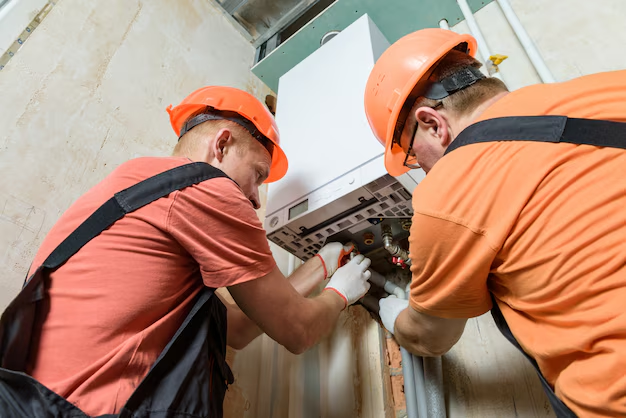Understanding 2023 HVAC Tax Credits: What You Need to Know
Navigating tax credits can sometimes feel like decoding a complex puzzle, especially when it comes to home improvements like HVAC systems. In 2023, homeowners have the opportunity to capitalize on tax incentives designed to promote energy efficiency. But which HVAC systems qualify, and how can you make the most of these benefits? Let’s dive into everything you need to know about claiming tax credits for HVAC systems in 2023.
The 2023 HVAC Tax Credit: An Overview
The government often offers tax credits to encourage energy-efficient upgrades, aiming not only to lower homeowners' bills but also to reduce environmental impact. In 2023, significant changes and extensions have been implemented to support more sustainable living. These credits are part of broader efforts to promote renewable energy solutions and reduce carbon footprints.
Understanding Tax Credits vs. Deductions
Before we get into details, it’s important to clarify the distinction between tax credits and tax deductions. Tax credits directly reduce the amount of tax you owe, making them more favorable than deductions, which reduce the amount of income that is taxed.
Key Features of the 2023 HVAC Tax Credit
- Economic Incentive: Homeowners can reduce initial costs of HVAC upgrades.
- Environmental Goal: Encourages use of eco-friendly technologies.
- Flexibility: Applies to a variety of HVAC systems.
Which HVAC Systems Qualify?
Knowing whether your desired HVAC system qualifies for the 2023 tax credit is crucial. Generally, the criteria focus on systems that enhance energy efficiency. The qualifying systems typically include those that meet stringent energy efficiency guidelines, often set by the Energy Star program.
Eligible Systems for Tax Credit
- Air Source Heat Pumps: These systems draw heat from the air and are designed to work efficiently in a variety of conditions.
- Geothermal Heat Pumps: Utilizing the earth's natural heat, geothermal systems are incredibly efficient but may require a higher initial investment.
- High-Efficiency Gas, Propane, or Oil Furnaces: Furnaces with an annual fuel utilization efficiency (AFUE) greater than certain thresholds.
- Central Air Conditioners: Must meet the SEER (Seasonal Energy Efficiency Ratio) standards.
- Advanced Main Air Circulating Fans: Only fans that consume a maximum of two percent of the furnace energy qualify.
Each of these systems must meet specific criteria within their categories, often defined by organizations like the Consortium for Energy Efficiency (CEE) or Energy Star.
How to Verify Qualification
- Look for Certifications: Ensure the system is Energy Star certified.
- Consult with Installers: Professional HVAC installers should be knowledgeable about which systems qualify.
- Manufacturer Information: Check product specifications and manufacturer details for compliance.
Steps to Claim Your Tax Credit
Claiming your HVAC tax credit involves several steps. By following these, you can ensure a smooth process at tax time.
Step-by-Step Guide to Claiming the Credit
Save All Receipts and Documentation: Retain all purchase and installation receipts, as well as equipment-specific documentation.
Complete IRS Form 5695: This form is specifically used for claiming Residential Energy Credits.
File With Your Tax Return: Attach all necessary forms and documentation when filing your annual tax return.
Consult a Tax Professional: Given tax complexities, a tax advisor can provide personalized guidance and ensure all details are correctly filed.
Benefits of the HVAC Tax Credit
Understanding the benefits of these tax incentives can further bolster your decision to upgrade.
Economic and Environmental Benefits
- Cost Savings: Offsets initial investment costs, leading to quicker return on investment.
- Lower Energy Bills: More efficient systems reduce monthly energy expenses.
- Eco-Friendly Choices: Supports broader environmental sustainability goals.
Long-Term Value
Investing in an energy-efficient HVAC system now not only saves money but also increases the desirability and value of your home. Energy efficiency is a key selling point in the real estate market, appealing to environmentally conscious buyers.
Potential Pitfalls and Considerations
While tax credits present numerous advantages, there are potential pitfalls you should be aware of.
Common Challenges
- Eligibility Confusion: Misunderstanding which systems qualify can lead to missed credits.
- Documentation Gaps: Missing proper documentation can complicate the claim process.
- Installation Errors: Improper installation might void eligibility, stressing the importance of professional installation.
Recommendations for Homeowners
- Stay Informed: Regularly update yourself on energy efficiency standards and tax credit requirements.
- Consult Experts: Don’t hesitate to reach out to HVAC professionals and tax advisors for proper guidance.
- Plan Ahead: Consider long-term savings and incentives when planning system upgrades.
📌 Essential Takeaways
- Verify Eligibility: Always confirm that your chosen system qualifies for the credit with proper certifications.
- Save Documentation: Keep thorough records for a hassle-free claim process.
- Get Professional Help: Utilize experts in both HVAC installations and tax preparation to maximize benefits.
Final Insight: Make an Informed Choice
Choosing an HVAC system that qualifies for tax credits in 2023 is more than a financial decision—it’s a step toward a sustainable future. By understanding the eligibility criteria, benefits, and potential challenges, homeowners can make educated decisions that benefit both their finances and the environment. Consider this an opportunity to contribute positively to energy conservation while enjoying substantial savings.
Utilize the available resources, stay informed, and plan diligently to take full advantage of these energy-saving initiatives. Investing in a qualifying HVAC system today paves the way for a greener tomorrow.

Related Topics
- Can I Pay My Taxes On a Credit Card
- Can I Pay My Taxes With a Credit Card
- Can You Claim Child Tax Credit With No Income
- Can You Pay Property Taxes With a Credit Card
- Can You Pay Taxes With a Credit Card
- Did Congress Pass Child Tax Credit
- Did The Child Tax Credit Pass
- Did The Child Tax Credit Pass 2024
- Do You Get a Tax Credit For Buying a House
- Does a New Roof Qualify For Energy Tax Credit
